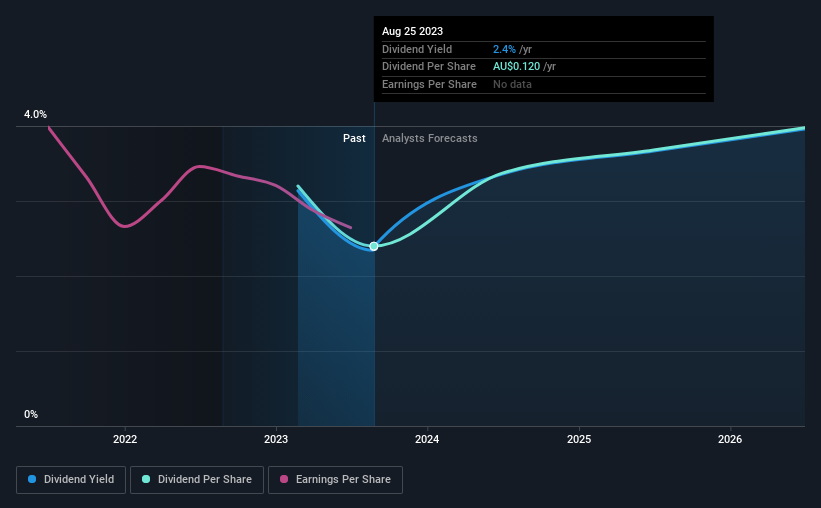We Wouldn't Be Too Quick To Buy The Lottery Corporation Limited (ASX:TLC) Before It Goes Ex-Dividend
It looks like The Lottery Corporation Limited (ASX:TLC) is about to go ex-dividend in the next 3 days. The ex-dividend date occurs one day before the record date which is the day on which shareholders need to be on the company's books in order to receive a dividend. The ex-dividend date is important as the process of settlement involves two full business days. So if you miss that date, you would not show up on the company's books on the record date. This means that investors who purchase Lottery's shares on or after the 29th of August will not receive the dividend, which will be paid on the 20th of September.
The company's next dividend payment will be AU$0.06 per share. Dividends are an important source of income to many shareholders, but the health of the business is crucial to maintaining those dividends. As a result, readers should always check whether Lottery has been able to grow its dividends, or if the dividend might be cut.
Check out our latest analysis for Lottery
Dividends are typically paid from company earnings. If a company pays more in dividends than it earned in profit, then the dividend could be unsustainable. Lottery paid out 118% of profit in the past year, which we think is typically not sustainable unless there are mitigating characteristics such as unusually strong cash flow or a large cash balance.
Click here to see the company's payout ratio, plus analyst estimates of its future dividends.
Have Earnings And Dividends Been Growing?
Companies with falling earnings are riskier for dividend shareholders. If earnings decline and the company is forced to cut its dividend, investors could watch the value of their investment go up in smoke. From this perspective, we're disturbed to see earnings per share plunged 24% over the last 12 months, and we'd wonder if the company has had some kind of major event that has skewed the calculation.
This is Lottery's first year of paying a dividend, so it doesn't have much of a history yet to compare to.
To Sum It Up
Should investors buy Lottery for the upcoming dividend? Not only are earnings per share shrinking, but Lottery is paying out a disconcertingly high percentage of its profit as dividends. Generally we think dividend investors should avoid businesses in this situation, as high payout ratios and declining earnings can lead to the dividend being cut. This is not an overtly appealing combination of characteristics, and we're just not that interested in this company's dividend.
With that in mind though, if the poor dividend characteristics of Lottery don't faze you, it's worth being mindful of the risks involved with this business. To help with this, we've discovered 3 warning signs for Lottery that you should be aware of before investing in their shares.
A common investing mistake is buying the first interesting stock you see. Here you can find a full list of high-yield dividend stocks.
Have feedback on this article? Concerned about the content? Get in touch with us directly. Alternatively, email editorial-team (at) simplywallst.com.
This article by Simply Wall St is general in nature. We provide commentary based on historical data and analyst forecasts only using an unbiased methodology and our articles are not intended to be financial advice. It does not constitute a recommendation to buy or sell any stock, and does not take account of your objectives, or your financial situation. We aim to bring you long-term focused analysis driven by fundamental data. Note that our analysis may not factor in the latest price-sensitive company announcements or qualitative material. Simply Wall St has no position in any stocks mentioned.

 Yahoo Finance
Yahoo Finance 
